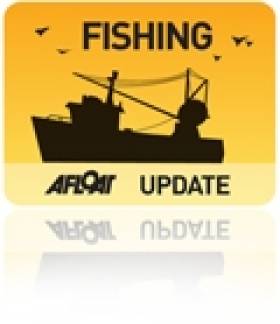Displaying items by tag: Irish South and West Fish Producers’ Organisation (IS&WFPO)
Fishing Industry Organisations Unite in Call for Fairer Quota Share after Brussels Meetings
Irish fishing industry organisations have united in a call for an “urgent review” of the implementation of the Common Fisheries Policy.
The organisations are also calling for a fairer share to rights to fish in the Irish exclusive economic zone (EEZ).
This follows a series of meetings recently in Brussels, organised and hosted by Sinn Féin MEP Chris McManus.
The Irish Fish Producers’ Organisation (IFPO), the Irish South and West Fish Producers’ Organisation and the Irish Fish Processors and Exporters Association were represented in Brussels, along with the Irish Fishing and Seafood Alliance, Foyle Fishermen’s Co-op and Galway & Aran Fishermen’s Co-op.
“Other nations catch about €250m worth of fish a year in our waters - almost twice as much as the Irish fleet catches,” IFPO chief executive Aodh O’Donnell said in a statement.
Quotas allocated by the EU to the Irish fishing fleet amount to “a paltry 18% of the volume of fish in our 200-mile Zone every year”, O’Donnell said.
“Other nations take the balance of the fish, but bizarrely some EU states are unable to catch their annual quota allocations in this EU zone,” he said.
“So, we are calling on the EU to – at the very least – enable reallocation of annual ‘uncaught’ quotas in Ireland’s EEZ to Irish vessels to give us a more equitable share,” O’Donnell explained.
Meetings were held with the European Parliament fisheries committee (Pech), and the Director General of the European Commission’s Directorate-General for Maritime Affairs and Fisheries (DG Mare).
Mr O’Donnell says the Irish delegation outlined ways of allocating the uncaught quotas of other EU states - for species such as langoustines and monkfish - to Ireland.
“We support calls for a sensible mechanism for an equitable redistribution of all the annual uncaught EU fish quota in EU waters. We acknowledge that any such redistribution would take account of the quota rights of each of these member states,” he said
“At present, non-EU fishing vessels can fish large volumes of pelagic fish on Ireland’s west coast, based on annual access agreements negotiated to benefit other EU states,” he said.
“ At the same time, the Irish fleet finds itself tied up at port, hindered from catching these same fish by low quotas. This needs to be addressed in a meaningful way so that our share of the important catch is more equitable,” he said.
The delegation also told EU officials and MEPs that the quotas transferred to Britain under the Brexit Trade and Cooperation Agreement (TCA) were inequitable.
“In particular, Irish fishing vessels were excluded from traditional fishing grounds in the waters around Rockall. So, we made the case that quotas needed to be adjusted to rebalance long-term losses and to restore access to these areas,” O’Donnell said.
He says fishing organisations are united in a call for an urgent review of how the CFP is implemented.
“In particular, we want changes in how the annual quota of fish is allocated to the Irish fishing fleet and to rebalance the significant Brexit losses. We also believe allocations should be based on having greater rights to fish in our own [coastal] zones,” O’Donnell said.
“This would be more democratic, and reduce the carbon footprint of EU fishing vessels, as they would travel shorter distances. It would also strengthen the economic and social linkage between those catching the fish and their coastal communities,” he said.
Ireland has no quota for Atlantic bluefin tuna, which is in “abundance” during the season off the Irish coast, O’Donnell said.
He said it could be worth €150 million annually in revenues to the Irish fishing and tourism sectors.
Large Japanese vessels are currently travelling halfway around the world to harvest these “highly valued” fisheries, and allocation to Ireland could also reduce the carbon footprint for this sector, he noted.
He said European Commission officials “took note of the submissions and undertook to have an additional follow-up meeting in Ireland”.
Fishermen Rewarded with Prestigious Marine Stewardship Certificates
Peter Whelan, Chairman of the Sea-Fisheries Protection Authority (SFPA), presented Gavin Power, Chairman of the Celtic Sea Herring Management Advisory Committee (CSHMAC) with the MSC Certification for Polyvalent Mackerel, today at the SFPA's Headquarters in Clonakilty, Co Cork.
Gavin Power of the Irish South and West Fish Producers' Organisation (IS&WFPO) and Chairman of the CSHMAC, said: "We are delighted to receive MSC Certification which is part of a structured approach towards improving the management and added value return from the polyvalent mackerel fishery. Importantly, this certification initiative represents the first such award for the Irish polyvalent sector and would not have been possible without the full support of the SFPA, the Marine Institute, the Department of Agriculture, Fisheries & Food and Bord Iascaigh Mhara.
MSC certification recognises sustainable practices in this important fishery, rewards robust governance, environmentally responsible and sustainable fishing practices and empowers consumers through the use of the label to make the best environmental choice."
Peter Whelan, Chairman of the SFPA said: "The CSHMAC's securing of the MSC's fishery certification program and seafood eco-label is significant as it recognises and rewards sustainable fishing and promotes the best environmental choice in seafood overall. Good governance and management frameworks safeguards jobs, secures fish stocks for the future and help to protect the marine environment. The MSC standard means sustainable fisheries can be recognised and rewarded in the marketplace and gives an assurance to buyers and consumers that their seafood comes from a well-managed and sustainable source."





























































